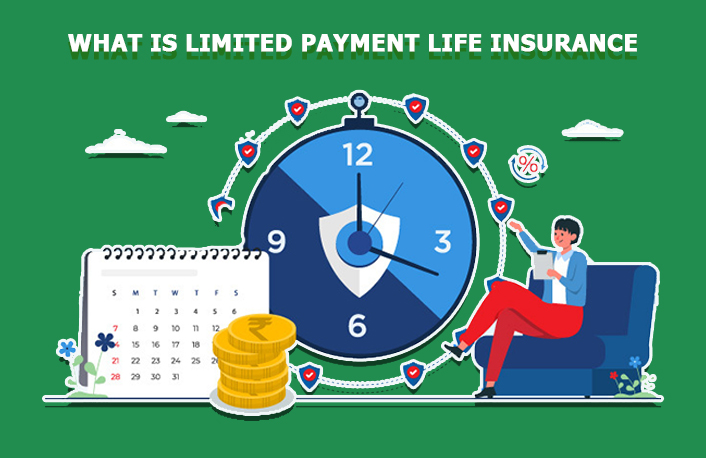Are long-life premiums discouraging you from thinking about permanent life insurance? Limited pay life insurance may be available to you. Limited payment life insurance shortens the period you have to pay premiums to a few years in exchange for a permanent death benefit for your family.

In addition, it implies that’s the amount you will pay and the end date of the payments. Moreover, this could provide you with more certainty when you plan out your financial strategy. This article will discuss every necessary detail about limited payment life insurance as you continue reading.
What is Limited Payment Life Insurance
A limited payment is a whole life insurance whereby the premiums are paid for a certain period instead of permanently. Though options differ by provider, some common forms of limited-pay policy include reimbursement for a decade or two (10, 15, and 20-pay life insurance).
Whole life insurance is frequently more suitable than universal life insurance or variable universal life insurance for limited payment. This is because you have a completely reimbursed permanent death benefit after you’ve paid all of your premiums.
How Does Limited Payment Life Insurance Work
The features of whole life insurance, including fixed premiums, cash value, and guaranteed death benefit, are offered by limited-payment life insurance. However, you disburse for the policy over a few years rather than settling for it for your entire life. Depending on your life expectancy and current age with standard whole life insurance, the cost of your policy is separated into payments by the insurers
For instance, the cost would be calculated using a 47-year life expectancy if you are 35 years old and your expected lifespan is 82 years. However, a limited-payment life insurance policy cost is shared over a certain term, ranging between 10 and 20 years.
Due to the shorter term, limited payment insurance policies have higher premiums. However, the policies pay off sooner and increase in cash value more quickly. Immediately the policy is paid completely, there won’t be any more premium payments required and you’ll be covered for life.
Types of Limited Payment Life Insurance
Limited-payment life insurance is the duration of the premium payment period. In addition, some of the most typical forms of limited pay policies available today are as follows:
Single payment whole life insurance
Single-pay whole life insurance is a policy that reimburses the total cost in one amount. It is appropriate for people who receive a large sum through inheritance. However, because it is classified as a modified endowment contract (MEC), it does not qualify for tax benefits such as income taxation. This means it does not qualify for the same tax breaks as other insurance policies.
7 pay life insurance
7 pay life insurance mandates the policyholder to reimburse premiums for seven years to obtain the policy. Once the seven years end, you will be suitable to obtain the death benefit for the rest of your life, with no additional payments. With a 7-pay policy, you can quickly pay off the entire cost of the policy while still enjoying the tax benefits of a whole-life policy.
10, 15, & 20 pay life insurance
10, 15, and 20 pay life insurance functions the same way as 7 pay. Regardless of the payment period you decide to begin, you will have many years to pay your premiums. The anticipated total cost of each of these policies is to be roughly the same. However, a 10-pay policy is more expensive than a 20-pay or 15-pay policy due to the same premiums over a shorter period.
Whole life insurance paid at age 65
whole life insurance payable at age 65 is determined by your against instead of the number of years you reimburse. You will pay the premiums until you turn 65, regardless of your age when you purchase the policy. You do not have to pay any additional premiums, but you will still be eligible for the death benefit.
Advantages and Disadvantages of Limited Payment Life Insurance
Limited payment life insurance has advantages and disadvantages similar to other types of life insurance. Knowing these can help you determine whether coverage is the most effective way to achieve your goals.
Advantages
Fewer premium-paying years
With a limited pay policy in years, you may be able to fully finance permanent coverage, particularly if your income increases or your financial obligations are not too great.
Quicker growth in monetary value
Your contract’s cash value will increase more quickly if you’re paying for it over a shorter period than you would if payments were shared over your lifetime. Given that your money has more time to grow the earlier you invest, this could be a calculated move. Cash value also rises tax-deferred.
Permanent coverage
After a set number of years, even though your premiums don’t, your coverage does. Your life insurance payout amount may rise over time if you use dividends from your policy to purchase paid-up additions.
Disadvantages
Higher rates
You’re paying for your life insurance policy over a shorter period even though it isn’t more costly than a limited pay policy.
Opportunity cost
You cannot use the money you pay toward your life insurance policy for any other purpose, such as purchasing real estate or making stock market investments.
Modified endowment contract (MEC)
To keep a limited-pay life insurance policy from turning into an MEC, it needs to be properly drafted. Because any cash value that exceeds the premiums you pay does not grow tax-deferred, an MEC may not be desirable.
How to Get Limited Payment Life Insurance
Limited-payment life insurance is an excellent choice for people who want peace of mind without incurring ongoing expenses. It provides lifetime coverage and is ideal for long-term financial requirements. Many elderly people prefer limited pay policies because of their cash value, guaranteed death benefit, and coverage for long-term care expenses.

